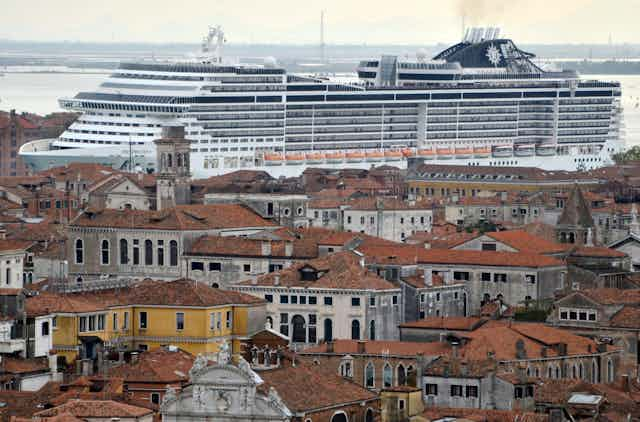As the detritus from another summer season is swept from the streets of holiday hot spots around the world, locals are wondering if it was all worth it. Disquiet has grown about tourists behaving badly and making local communities suffer for their pleasure. In Palma de Mallorca, graffiti recently appeared telling tourists to “go home”. In New Orleans, a “neighbours, not tourists” campaign argues that AirBnB rentals erode local communities. In Venice, posters have been put up telling tourists they are ruining the city.
There is a belief that the tourism system, like the financial system, is not working for everyone. Local residents are starting to feel like they’re receiving less than they’re giving. A combination of societal and economic concerns, a reduction in quality of life, alongside innovations that seem to push out traditional tourism work in place of a “gig economy”, is in part driving new tensions.
When Spanish taxi drivers torched ride-sharing cars, they were reacting not only to the disruption of the so-called sharing economy, but also how predatory capitalism is creating new distrust, jealousy and social distance in an industry which politicians and businesses have long heralded as bringing stable jobs, intercultural dialogue and opportunity.
Destinations such as Santorini in Greece and Cinque Terre in Italy are considering restrictions on tourist arrivals. Dubrovnik has introduced cameras to monitor the number of visitors. In Paris, incivility police tackle antisocial behaviour such as littering, while Magaluf introduced 64 bylaws to curb behaviours such as dropping cigarettes in the street, defecating, urinating or spitting in public places.

A climate of mistrust has created a new wave of tourist codes of conduct. The aim is to assign rules to make tourists more sensitive to local residents. Hvar in Croatia warns tourists that they face fines of €600 if they fail to dress appropriately. Dubrovnik enforces a dress code. Venice can hand out fines ranging from €25 to €500 for bad behaviour. That includes breaking a rule that states “no standing at any time” – even to eat and drink. Other codes of conduct have been introduced in Vietnam and Cambodia.
A moral code
But there’s a problem here. City authorities, and managers of tourist attractions who impose moral laws aren’t accountable to the people who are supposed to abide by them. The danger is that they perpetuate narratives about marauding tourists. They do, however, work as marketing strategies, with local politicians and businesses happy to gain reputational capital by scapegoating tourists for bad behaviour in their area.
Requiring tourists to dress a certain way does not nurture trust and solidarity. Nor does it reduce exploitation or over-commercialisation. Codes create more social and physical distance between tourists and residents. They won’t make relations between tourists and residents any warmer, protect historic buildings, increase low pay for tourism workers, or prevent AirBnB from saturating residential areas. Indeed, distrust may contribute to the decline of tourism’s cultural merits.

To rebuild trust and restore faith in the tourism system, authorities must step outside of their traditional roles. They need to work towards a smarter governance model that puts people rather than businesses first. It must recognise all those who have a stake in tourism and come up with strategies that work for all sides.
Most people realise that tourism is economically and socially important. By putting people at the heart of everything they do, tourists and residents can coexist with and relate to each other without regulating behaviour or imposing codes of conduct. That might mean limiting the number of hotels that can operate or AirBnB properties that can be registered. Longer term tourism strategies could also seek to cut out the short-term political meddling that can leave local residents asking themselves who is really benefiting from tourism in their area.

